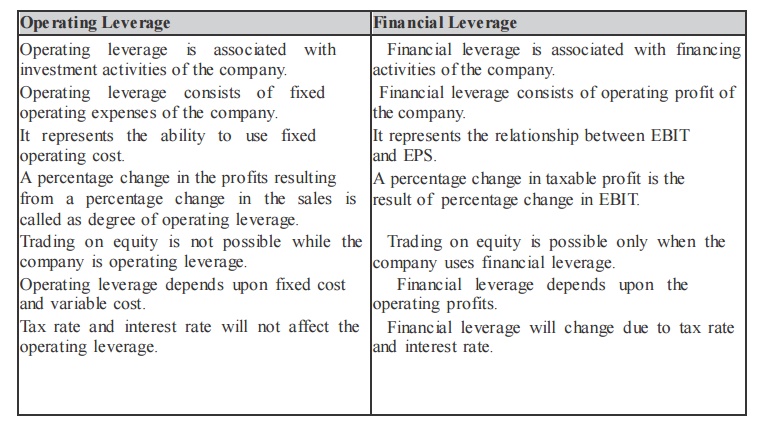Chapter: Business Science : Financial Management : Financing and Dividend Decision
Leverages
Leverages
Leverage refers to ―an increased means of
accomplishing some purpose‖. Leverage allows us to accomplish certain things
which are otherwise not possible, viz lifting of heavy objects with the help of
leverages.
In financial management , the term ‗leverage‘ is
used to describe the firm‘s ability to use fixed cost asset or funds to
increase the return to its owners i.e, Equity shareholders.
The employment of an asset or sources of funds for
which the firm has to pay a fixed cost or fixed return. The fixed cost is also
called as fixed operating cost and the fixed return is called financial cost
remains constant irrespective of the change in volume of output of sales
Higher
the degree of leverage, higher is the risk as well as return to the owner.
1. Financial
leverage or Trading on equity
2. Operating
leverage
3. Combined
leverage or composite leverage
1 Financial leverage
Leverage activities with financing activities is called
financial leverage. Financial leverage represents the relations hip between the
company‘s earnings before interest and taxes (EBIT) or operating profit and the
earning available to equity shareholders.
Financial
leverage is defined as ―the ability of a firm to use fixed financial charges to
magnify the effects of changes in EBIT on the earnings per share‖.
Financial
leverage may be favourable or unfavourable depends upon the use of fixed cost
funds. Favourable financial leverage occurs when the company earns more on the
assets purchased with the funds, then the fixed cost of their use. Hence, it is
also called as positive financial leverage.
Unfavourable
financial leverage occurs when the company does not earn as much as the funds
cost. Hence, it is also called as negative financial leverage.
Financial
leverage can be calculated with the help of the following formula:
Degree of Financial Leverage
Degree of
financial leverage may be defined as the percentage change in taxable profit as
a result of percentage change in earning before interest and tax (EBIT). This
can be calculated by the following formula

Alternative Definition of Financial Leverage
According
to Gitmar, ―financial leverage is the ability of a firm to use fixed financial
changes
to magnify the effects of change in EBIT and EPS‖.
FL =
Financial Leverage
EBIT =
Earning Before Interest and Tax
EPS = Earning
Per share.
2 Uses of Financial Leverage
Financial leverage helps to
examine the relationship between EBIT and EPS.
Financial leverage measures the
percentage of change in taxable income to the percentage change in EBI T.
Financial leverage locates the
correct profitable financial decision regarding capital structure of the
company.
Financial leverage is one of the
important devices which is used to measure the fixed cost proportion with the
total capital of the company.
If the firm acquires fixed cost
funds at a higher cost, then the earnings from those assets, the earning per
share and return on equity capital will decrease.
The impact of financial leverage
can be understood with the help of the following exercise.
3 Operating leverage
The leverage associated
with investment activities is
called as operating leverage.
Operating leverage can be calculated with the
help of the following formula:

W here,
OL =
Operating Leverage
C =
Contribution
OP =
Operating Profits
Uses of Operating Leverage
Operating
leverage is one of the techniques to measure the impact of changes in sales
which lead for change in the profits of the company.
If any
change in the sales, it will lead to corresponding changes in profit. Operating
leverage helps to identify the position of fixed cost and variable cost.
Operating leverage measures the relationship
between the sales and revenue of the company during a particular period.
Operating leverage helps to understand the
level of fixed cost which is invested in the operating expenses of business
activities.
Operating leverage describes the over all
position of the fixed operating cost.
DISTINGUISH BETWEEN OPERATING LEVERAGE AND
FINANCIAL LEVERAGE

Operating Leverage
Operating
leverage is associated with investment activities of the company.
Operating
leverage consists of fixed operating expenses of the company.
It
represents the ability to use fixed operating cost.
A
percentage change in the profits resulting from a percentage change in the
sales is called as degree of operating leverage.
Trading
on equity is not possible while the company is operating leverage.
Operating
leverage depends upon fixed cost and variable cost.
Tax rate
and interest rate will not affect the operating leverage.
Financial Leverage
Financial
leverage is associated with financing activities of the company.
Financial
leverage consists of operating profit of the company.
It represents
the relationship between EBIT and EPS.
A
percentage change in taxable profit is the result of percentage change in EBIT.
Trading
on equity is possible only when the company uses financial leverage.
Financial
leverage depends upon the operating profits.
Financial
leverage will change due to tax rate and interest rate.
Composite leverage
Combination
of operating &financial leverage is called composite leverage
Working Capital Leverage
One of
the new models of leverage is working capital leverage which is used to locate
the investment in working capital or current assets in the company.
Working capital leverage measures the sensitivity of return in investment of charges in the level of current assets.
Related Topics